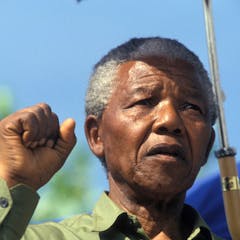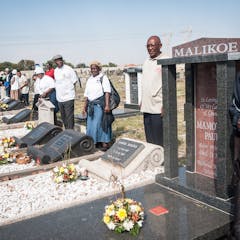
Articles on Nelson Mandela
Displaying 41 - 60 of 209 articles

FW de Klerk as National Party conservative was paradoxically the right leader at the right time to relinquish white minority rule.

Klaaste was distressed by what was happening in black communities, where residents faced state terror and political violence. He sought to restore values such as self-help and neighbourly conduct.

The archbishop’s willingness to listen to those of a different viewpoint and his staunch opposition to violence made him a pivotal figure in the end of Apartheid in South Africa.

The extent to which presidents adhere to the constitutional written code will have profound implications in relation to their use of executive power.

Ramaphosa is set to go down in the annals of history as an ANC president who presided over a tumultuous epoch in the party’s evolution.

The suggestion that Mandela single-handedly achieved democracy is as intellectually threadbare as the charge that he was centrally responsible for the failure to transform South Africa.

When the Truth and Reconciliation was mandated to investigate human rights violations from March 1960, that left twelve years of apartheid rule unexplored.

South Africans deserve a fuller picture of the extent of police brutality, and the level of accountability, especially when people die at the hands of police.

The low levels of familiarity with key historical events indicate that there are serious shortcomings in the development of national collective memory in South Africa.

Jackson Mthembu’s death drives home the seriousness of the COVID-19 pandemic in the country.

Professionalism has to start with ministers for it to stand any chance of being embedded throughout the public service.

In both countries, neglect and misinformation at the highest levels of government led to undue tragedy.

There are individual activists and political groupings who believe violent action is legitimate and use the circumstances to actively drive such behaviour.

A realignment is needed as the current systems have lost the competence to midwife a new nation out of the formative experiences of the last 25 years.

Claiming a right to determine reality by mere say-so is becoming increasingly commonplace, but we should never get used to it.

CC BY-NC-ND6.22 MB (download)
Reflecting on the life of George Bizos, one of South Africa's shining lights.

In each of his novels, he explored questions that shifted South Africa’s cultural debates, especially about memory and race.

The book shows that the claim made by some analysts that it was the fall of communism that prompted moves towards negotiations to end apartheid is off the mark.

That none of his collections were published in apartheid South Africa testifies to the police state’s censorship.

The gift of his images lies in their depiction of the social worlds that apartheid sought to destroy, but that live on through the photographs.
